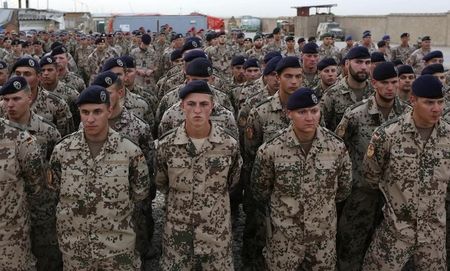BERLIN (Reuters) - Germany and Italy plan to keep a total of up to 1,350 soldiers in Afghanistan in 2015 to help train local armed forces, their defense ministries said on Tuesday, a slightly larger contingent than had been previously expected.
After more than a decade of combat operations in Afghanistan, where Taliban insurgents remain a major security threat, NATO plans to refocus next year on its core mission of defending Europe and North America.
But the United States and other nations want to keep thousands of troops there for counter-terrorism and training of Afghan personnel after U.S. forces formally withdraw this year.
Germany aims to retain up to 850 soldiers in Afghanistan, a German defense ministry spokesman said, while Italy will go with an average of about 500, according to the defense minister.
Germany has had some 3,200 soldiers in Afghanistan as part of a NATO-led mission there, while Italy now has about 1,800. Germany had been planning to reduce that to a force of 600 to 800 soldiers from January.
The German spokesman confirmed a Sueddeutsche Zeitung report that the number had been revised up slightly, saying this was because the German military would continue to be responsible for the international mission in northern Afghanistan.
Italy had pledged to leave a contingent near the city of Herat, the area currently under its control. Italian media had previously reported that about 200 soldiers would remain.
"We will respect the commitments made. I proposed an average of 500 soldiers" to be kept in Afghanistan from 2015, Italian Defence Minister Roberta Pinotti told reporters in Brussels. Her proposal must be approved by parliament.

The new NATO training and advisory mission will need about 12,000 soldiers, 8,000 of which will be provided by Washington, a senior U.S. military official said in June. Other NATO allies and partner countries are to come up with some 4,000 soldiers.
(Reporting by Sabine Siebold and Francesco Guarascio in Brussels; Writing by Erik Kirschbaum and Steve Scherer; Editing by Mark Heinrich)